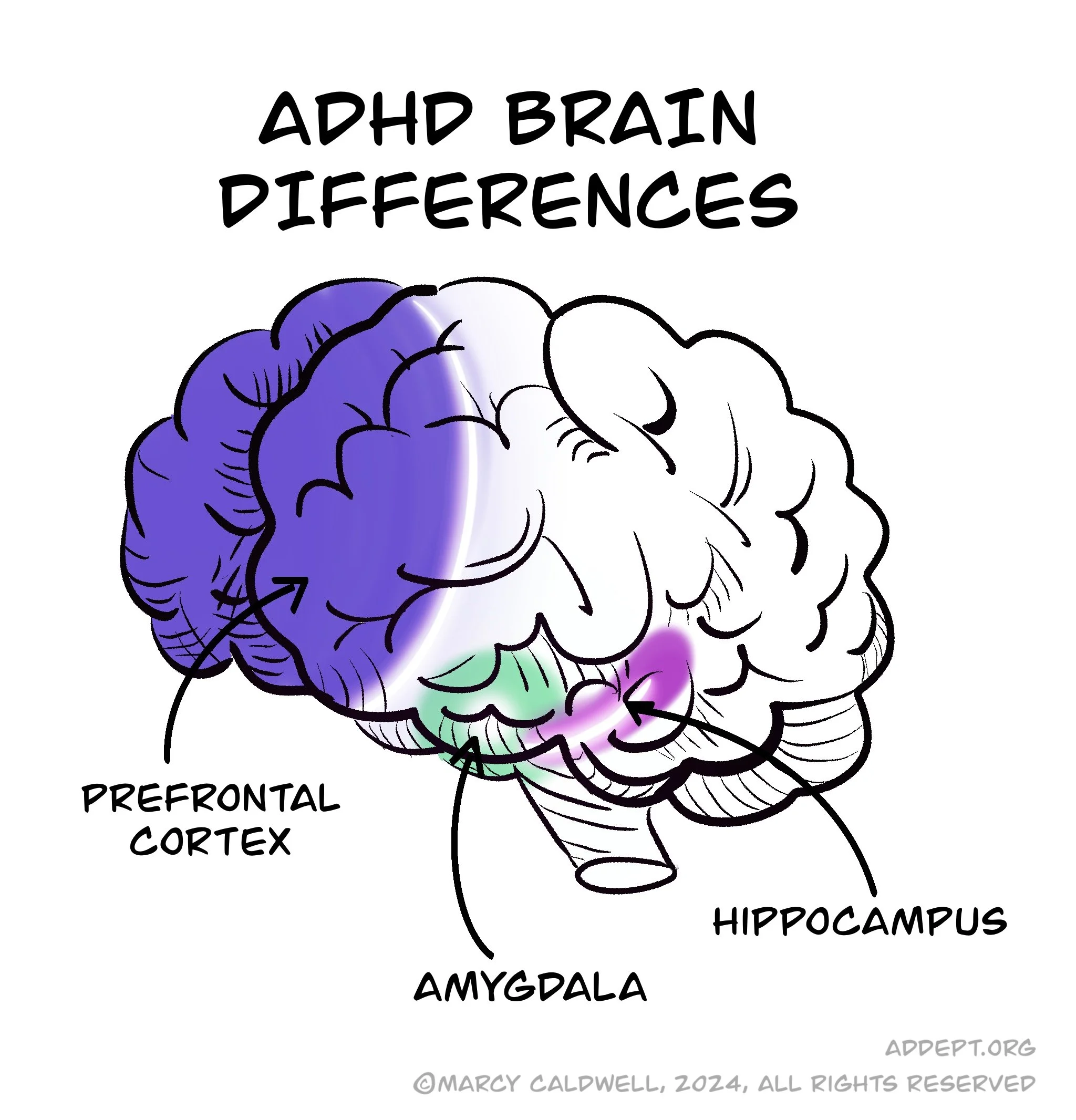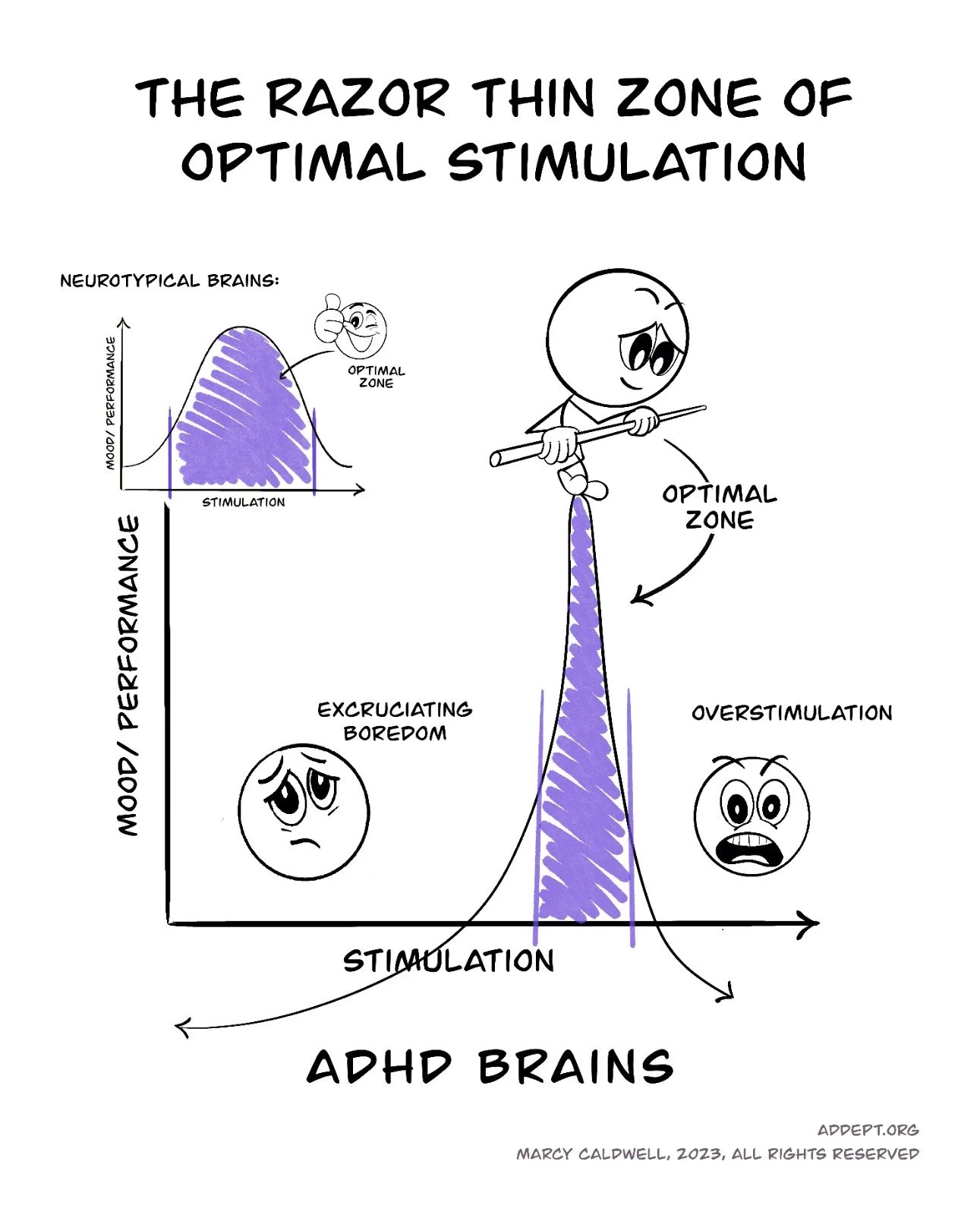Brain.FM Review:
Can Focus Music Really Help Your ADHD Brain Stay on Track?
Brain.FM claims to be a functional focus music streaming service designed to block out external distractions and activate your brain to help you focus. But does it actually work?!? Read my honest review of the science, the experience, and the results of Brain.FM.
A few months ago, I got tired of feeling like my brain was a ping-pong ball bouncing between distractions. I work in a coworking space, and I love it, but the noise and constant stream of people and conversations draw my attention so often that I find myself exhausted by mid-day.
And because I’m always looking for more ways to avoid distraction instead of depleting my precious executive functioning resources resisting them, I went on a quest for ways to block the sound of all my productive neighbors-- earplugs only worked a bit, Pandora kept interrupting with ads and I quickly grew bored of Calm music.
Which brought me to my new best friend: Functional Focus Music.
Of course, my inner geek got super excited about the research backing up this new player in the focus-boosting field. But research can be made to say a lot of things. So, I decided to take made-to-purpose music for a focus-boosting spin by downloading the new subscription focus music streaming service, Brain.FM.
After using it for the past month, I’ve got an honest, in-depth review of not just the pros and cons of this new music but also exactly what all the research they cite so often is all about.
So, brew a cup of joe, grab those headphones, and let’s dive in!
Think you might have ADHD?
Take a free online assessment to find out.
(Takes 3 minutes)
TAKE THE QUIZWhat is it about the ADHD brain that makes focus so hard?
There is a reason those squirrel ADHD memes are both funny and cringe-inducing- they just feel so painfully true sometimes- anything and everything can take an ADHD brain off track. And as annoying as that is, what really hurts are the early (downright wrong) messages we hear about our tendency to be distracted- that distraction is a sign of inherent laziness or lack of willpower. But it’s not a matter of character- it’s a brain difference.
Structural and Functional Brain Differences
Research shows that the difficulty with focus for the ADHD brain has nothing to do with character or drive. The reason ADHD brains struggle to stay on task has to do with differences in the structure and function of key brain regions like the prefrontal cortex, the hippocampus, and the amygdala. We can see these differences in the actual volume, size, and functioning of these brain regions.
Default Mode Network Differences
But that’s not all, ADHD brains have a difference in their Default Mode Network (the network of our brain that I call brain recess) that means that it doesn’t turn off when our Task Positive Network gets busy with a task like a neurotypical brain does. (Want to know more about the default mode network? Check out this post here.) Essentially, it’s like the ADHD brain is a 2nd grader whose school desk has been dropped into the middle of the playground—are we really going to blame that 7-year-old for not being able to finish his math assignment?!?
No. Not only aren’t we going to blame him, but we’re going to start building some walls around him to block out the distraction of that playground.
That’s where functional focus music can come in- not only does it get our 7-year-old brains optimally engaged but it starts to build walls around our workspace keeping distraction at bay.
What is functional focus music?
Functional focus music is more than just concentration, productivity, or study music. It goes way beyond some Beethoven and Bach. Functional focus music is a specialized type of music designed to serve a predetermined purpose other than entertainment or pleasure. It’s composed and crafted to optimize various cognitive states like focus, relaxation, sleep, or creative flow. Unlike typical genres, functional music is intentionally designed to activate your brain to an optimal zone for each one of those purposes.
Typically, functional focus music includes repetitive melodies, steady rhythms, and ambient sounds, creating a harmonious and immersive auditory environment that shifts your brain states. These elements work synergistically to create a state of calmness and mental relaxation while simultaneously stimulating your brain to an optimal level of engagement.
What is Entrainment? What does it have to do with Focus Music?
The underlying brain science supporting the effectiveness of functional music is grounded in the concept of ‘entrainment’—which basically means the synchronization of brainwave activity with external stimuli. Certain types of music, particularly those with consistent rhythms and frequencies that alternate between ears, can induce this state, leading to improved focus, relaxation, or sleep.
The key advantages of focus music for ADHD Brains
It activates your brain to the optimal level for focus and attention.
It helps avoid distractions by eliminating “auditory salience” (a fancy term for sounds that grab your attention).
ADHD brains so often fall to the extremes. And that’s never truer than when it comes to stimulation- ADHD brains are often either under or overstimulated (it’s why it’s simultaneously true that they are impulsive and sensation-seeking but also so often overwhelmed). But when an ADHD brain is optimally stimulated?!? When it’s challenged, engaged, and on task?!? Watch out! Amazing things are bound to happen!
But getting to that optimal zone of stimulation is tricky. We need just enough that we can hone in but not so much that we’re overwhelmed. That is the real trick of functional music. By activating our brainwaves through soundwave patterns, functional focus music can activate our brains to that perfect, just-right level- lifting us out of boredom while also holding overstimulation at bay.
What is Brain FM?
Brain FM isn’t your average music streaming service—it's a neuroscience-based audio platform that works to put your brain into an optimally engaged zone for focus. It utilizes continual research to create personalized music designed to boost your brain function and enhance your productivity.
Unlike traditional music playlists, Brain FM's music is carefully crafted using algorithms that target specific brainwave frequencies associated with focus and attention. By tailoring the music to your preferences and cognitive needs, Brain FM helps you to enter a state of heightened focus and concentration.
What makes Brain FM different from other focus stations?
Brain FM likes to tout that it is set apart from other focus music options by combining cutting-edge neuroscience with personalized music experiences—in other words, it is curated to your needs and interests.
But what makes my heart and brain smile is Brain FM's commitment to ongoing research and development that claims to ensure that its music remains effective and adaptive to the needs of ADHD brains. In fact, when you first sign up, Brain.FM asks you a series of questions like how you want to use it, why types of music you like, and if you have ADHD. It then crafts music to suit your tastes and your needs.
Brain FM music is engineered to stimulate your brain to the optimal level for focus and attention. Because it has been found that ADHD brains benefit from specific amplitudes of sound waves, Brain FM personalizes the music to fit whichever type of stimulation your brain needs.
If you’d like to nerd out, you can explore the science behind Brain FM here.
Is Brain.FM the same as binaural beats?
Well, let’s start with this: what are binaural beats to begin with?
Binaural beats are auditory effects that have used since the 19th century to assist with meditation, stress reduction and enhancing concentration. Binural beats are created when two slightly different frequencies are played separately to each ear. This is thought to synchronize brainwaves to specific frequencies, potentially creating states of relaxation and focus.
Brain.FM and Binaural Beats: The Difference:
Binaural beats primarily affect the lower brain regions with weak neural synchrony while Brain FM specifically targets the prefrontal cortex. Because this part of the brain is responsible for higher-level thinking, creativity, and attention and the primary brain region implicated in ADHD, it makes Brain.FM a particularly interesting intervention for our brains.
Unlike binaural beats, Brain FM incorporates newer neuroscience on auditory processing to specifically target optimal brain stimulation. Brain FM describes itself as a big leap forward in the auditory stimulation world. Think of Brain FM as the next generation of binaural beats, where traditional concepts have been reimagined and enhanced to better target cognitive functions and creativity.
Ok, so after my geeked out deep dive, I was pretty excited to take it for a spin (or really more like a cross-country road trip, given I started 1 month ago and I haven’t wanted to stop!)
Pros of Brain.FM
Totally tailored experience—it’s customized for your brain’s optimal focus stimulation.
Personalized—you can personalize the sound to your preferences
Scientifically backed—it is proven to be helpful for ADHD brains (in fact, it’s designed for them).
Long songs—you can tune into lengthy tracks that last your whole working day, without interruption.
Infinite play—you can make the most of uninterrupted focus sessions without having to select tracks (perfect for that late night study sprint).
Cons of Brain.FM
Pricey—Brain.FM’s monthly subscription fee of $9.99 can feel like a big commitment. But, for me- the free seven-day trial was key in helping me sign on so I could give it a whirl before forking over the cash. [Also, guys, because I am such a big fan, I talked with them over at Brain.FM and they offered to give readers a 20% discount if you use the code addept during checkout]
Memory dependent—while this sounds obvious, one of the biggest downsides to Brain.FM is that you need to remember to turn Brain FM on to get its benefit. And of course, we know this can be tricky for our ADHD brains (but that’s where our strategic cue systems come in!)
Brain.FM in a nutshell
Brain.FM is potentially a terrific tool for adults with ADHD seeking to improve their focus and productivity. By harnessing the latest advances in neuroscience and music technology, it offers a unique, side-effect-free solution to some of challenges that come with having an ADHD brain, that is well worth the monthly price-tag.
Get a discount on a Brain.FM subscription
Want to try it out for yourself? Download Brain.FM and experience the functional music difference for free for 7-days.
And then- and here’s a cool little bonus for doing this functional music deep dive. Get 20% off after your seven-day free trial with the code — addept.
















ADHD Rejection Sensitivity at Work: How to Manage Criticism and Fear and Thrive in Your Job